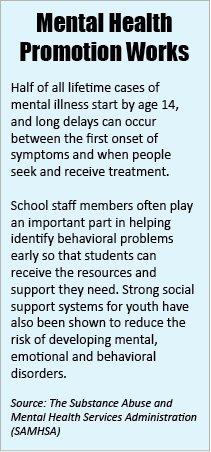SPRINGFIELD — The Illinois State Board of Education (ISBE) will expand its efforts to help schools better identify and respond to mental health issues among youth through a $1.9 million federal grant program. A large portion of the funds will be shared among three Illinois school districts to build relationships with their community health providers to better serve students with behavioral health issues.
“Social, emotional and behavioral issues directly influence educational outcomes,” said State Superintendent of Education Christopher A. Koch. “Students with social and emotional needs are more likely to struggle making it to school each day and may lose their focus on academics. Helping students stay connected to peers, role models, and other supports helps them to avoid poor attendance and performance. Preventing problems in school is always better for the students and more cost effective than dealing with issue later following a crisis.”
The Substance Abuse and Mental Health Services Administration (SAMHSA), sponsors the grant, called “The Project AWARE” grant (or IL-AWARE). Illinois received state-level Project AWARE funding, which aims to develop a comprehensive, coordinated plan for Advancing Wellness and Resilience in Education (AWARE) for school-aged youth. The funding supports two components:
- Addressing the mental health needs of children, youth, families/caregivers and communities.
- Implementing mental health training at both the state and local community levels.
Through the state IL-AWARE grant, ISBE will roll out Youth Mental Health First Aid (YMHFA) training and Mental Health First Aid (MHFA) training for adults 18 and older in school districts statewide over the next five years. This training will help school personnel, emergency first-responders and other adults who interact with school-aged children learn how to detect and respond to mental illness in children, youth and young adults, including how to encourage adolescents and families experiencing these problems to seek and receive treatment.
IL-AWARE will also fund work within three school districts. The grant will help assemble students, parents, educators, mental health providers, local law enforcement, juvenile justice agencies and other community-based organizations within districts with specific needs to develop and implement a comprehensive plan that promotes mental health and a safe and supportive school climate. All three districts have previously reached out to the agency for behavioral health supports. They are:
- East Aurora School District 131, a densely populated urban district in northern Illinois. This district has a large immigrant and low-income population and is in need of connections with community mental health providers.
- Decatur Public School District 61, a middle-size district in central Illinois in need of a community-based mental health infrastructure for children and adolescents.
- Harrisburg Community Unit 3 School District, a southern Illinois community whose rural nature creates issues for connecting individuals with services.
In collaboration with ISBE, these three districts will build their capacity to put violence prevention strategies and safe school policies into practice and develop partnerships with local behavioral health providers and children’s organizations.
The program aims to ensure these systems and resources work well together and are sustainable to meet the mental health needs of youth over time.
Another three Illinois school districts have each separately received a local Project AWARE grant, which is meant to improve the mental health literacy of adults who interact with students and raise awareness of youth mental health issues. Illinois’ local Project AWARE recipients are:
- City of Chicago School District 299
- Wabash Community Unit School District 348
- Champaign Community Unit School District 4
These three districts will be invited to serve on the State Management Team for IL-AWARE, along with East Aurora, Decatur and Harrisburg. This team will develop and implement the grant’s coordination and integration plan, which will ensure that systems and policies that support mental health and wellness for schoolchildren are continually developed and reviewed and remain highly collaborative. The team will also work to promote coordinated care among multiple organizations and systems that serve children at the state level and in partnership with the participating school districts.
